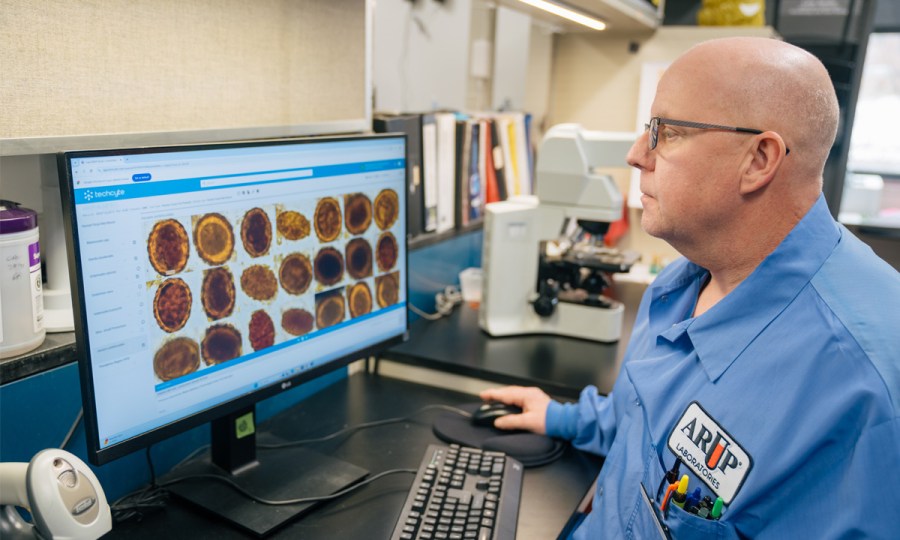Top Stories
AI Revolutionizes Detection of Human Parasites in Groundbreaking Study

UPDATE: A groundbreaking advance in medical technology has just been unveiled as scientists at ARUP Laboratories in Salt Lake City have integrated artificial intelligence (AI) into the diagnosis of human parasites. This revolutionary development, announced in March 2025, positions ARUP as the first laboratory globally to apply AI across the entire parasite testing process.
The innovative AI screening algorithm is set to transform how parasitic infections are diagnosed, significantly enhancing clinical sensitivity and accuracy. According to Blaine Mathison, BS, M(ASCP), technical director of Parasitology at ARUP, “Our validation studies have demonstrated the AI algorithm has better clinical sensitivity, improving the likelihood that a pathogenic parasite may be detected.” This breakthrough could mean faster and more reliable diagnoses for patients suffering from parasitic infections.
In collaboration with Techcyte, a Utah-based tech firm, researchers trained the AI using over 4,000 parasite samples. This extensive training has enabled the AI to identify an astonishing 169 additional organisms that traditional microscopy methods failed to detect. Mathison emphasized the significance of this achievement, stating, “It has been a groundbreaking effort, and what we’ve accomplished is remarkable.”
Traditional methods of detecting human parasites have been labor-intensive, relying heavily on microscopy. With the integration of AI, ARUP aims to alleviate the workload on laboratory staff while simultaneously improving diagnostic accuracy. As Dr. Adam Barker, chief operations officer at ARUP, noted, “Researchers can now identify more organisms than before by using AI.”
The implications of this technology extend beyond laboratory efficiency; they could redefine treatment protocols and improve patient outcomes. As ARUP continues to innovate, they are committed to developing more advanced technologies, including AI solutions, to enhance diagnostic capabilities and streamline laboratory processes.
The urgency of this development cannot be overstated. As healthcare systems worldwide seek to improve diagnostic accuracy and patient care, the integration of AI in parasite detection is a significant leap forward. This breakthrough not only enhances the ability to identify infections but also has the potential to save lives.
Stay tuned for more updates on this developing story as ARUP leads the charge in transforming the landscape of parasitic disease diagnosis. This is a pivotal moment for medical science, one that promises to reshape how healthcare providers approach parasitic infections in the future.
-

 Science3 months ago
Science3 months agoALMA Discovers Companion Orbiting Giant Red Star π 1 Gruis
-

 Science3 months ago
Science3 months agoDoctoral Candidate Trivanni Yadav Advances Battery Research at UTulsa
-

 World4 months ago
World4 months agoGlobal Air Forces Ranked by Annual Defense Budgets in 2025
-

 Top Stories4 months ago
Top Stories4 months agoNew ‘Star Trek: Voyager’ Game Demo Released, Players Test Limits
-

 World4 months ago
World4 months agoMass Production of F-35 Fighter Jet Drives Down Costs
-

 Sports3 months ago
Sports3 months agoNASCAR Faces Fan Backlash as Steve Phelps’ Texts Surface
-

 Business4 months ago
Business4 months agoGold Investment Surge: Top Mutual Funds and ETF Alternatives
-

 Top Stories4 months ago
Top Stories4 months agoDirecTV to Launch AI-Driven Ads with User Likenesses in 2026
-

 Politics4 months ago
Politics4 months agoSEVENTEEN’s Mingyu Faces Backlash Over Alcohol Incident at Concert
-

 Science4 months ago
Science4 months agoTime Crystals Revolutionize Quantum Computing Potential
-

 Entertainment4 months ago
Entertainment4 months agoFreeport Art Gallery Transforms Waste into Creative Masterpieces
-

 Science4 months ago
Science4 months agoRemembering David E. Brest: A Life Dedicated to Nature and Family









